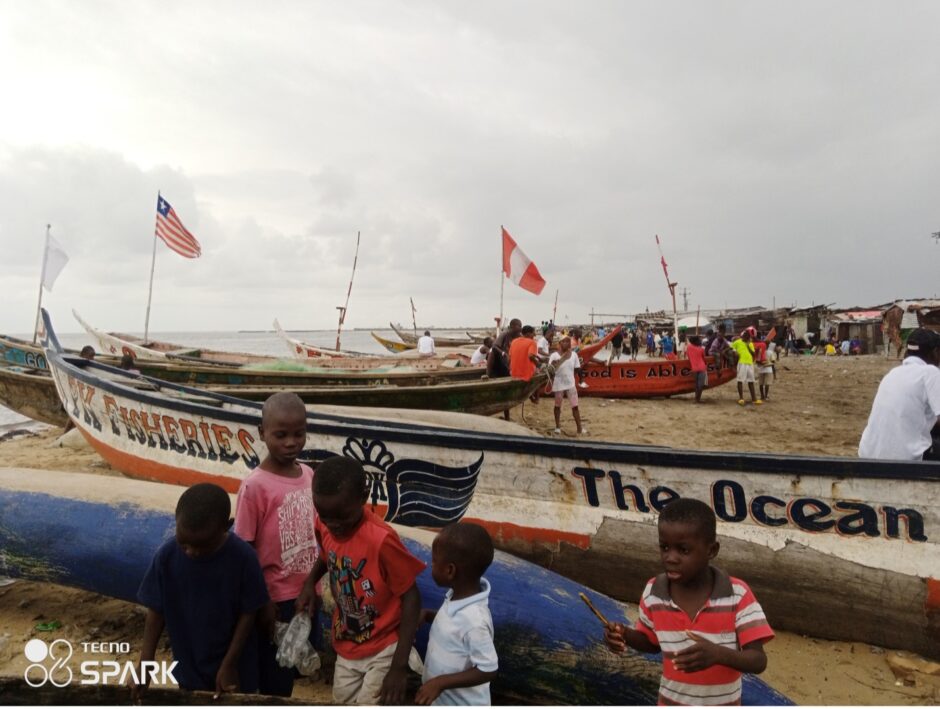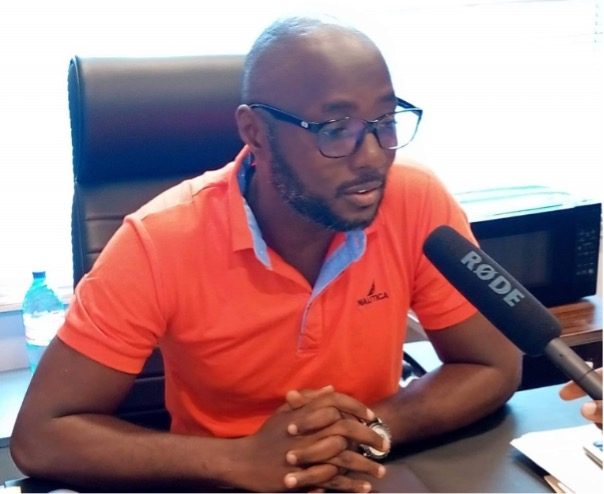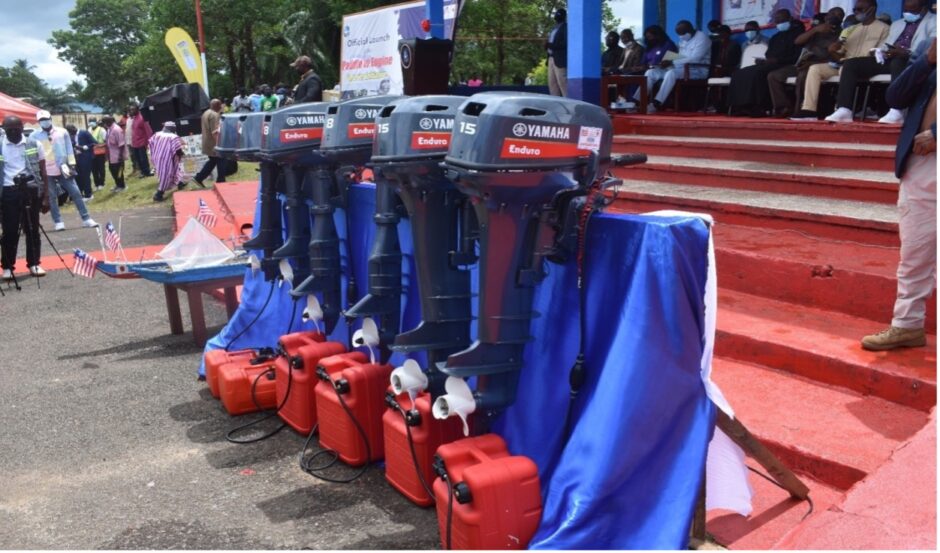
By Nemenlah Cyrus Harmon with New Narratives
WEST POINT BEACH, Monrovia – Food is getting scarcer in Liberia. People can feel it every day in rice shortages at the market and higher prices. The pandemic and the war in Ukraine have played a role but the biggest factor is climate change and it’s only going to get worse.
Securing food sources – particularly sources of protein – for Liberia’s five million people is becoming increasingly urgent. A key source of protein is fish, but the fish supply is falling. Fishermen bring in smaller catches every year. For now, the gap is being filled by expensive imports of frozen fish.
Liberia has the lowest average fish per capita consumption rate in the Manor River region according to a USAID and ECOWAS reports. Each Liberian consumes an average of just fives kilograms a year although the average should be at 23.5kg per person the reports say.
Preventing Ocean Pollution, a Priority
Experts say boosting Liberia’s fish stocks is critical. There’s a lot that’s out of Liberian control – but there is a lot that they can do. Preventing ocean pollution and protecting precious sea life must be a priority.
“The decline in health of the ocean, there are several factors responsible,” says Jerome Nyenka, University of Liberia’s Assistant Professor of Forest Economics, Forest Carbon and Climate Change. “The largest contribution of pollution to the ocean is from the fisheries sector. If the sector is not managed properly, it will increase the pollution potential from the sector.”
Jerome Nyenkah is one of many experts backing a new $40m World Bank funded project to overhaul Liberia’s fishing industry. Key targets in coastline fishing are replacing old rubber nets and putting motor engines on the three thousand three hundred canoes used by the eleven thousand fishers in Liberia’s fleet.
A first target is the nets the fishers use. The ones they use now are made of rubber.
According to experts, rubber nets damage oceans because they do not break down. When rubber nets are discarded, they trap and kill many types of sea life including those that fish feed on. Replacing them with biodegradable nets is crucial to helping boost the country’s fish stocks. And that will help cut down on the amount of frozen fish Liberia imports.
The last two years have seen a major push by the National Fisheries and Aquaculture Authority or NAFAA and international donors to improve practices across Liberia’s nine coastal counties. The government agency in charge of fisheries, began distributing nets, known as “thread nets,” last year. But they have met a lot of resistance among local fishermen.
“NaFAA net doesn’t catch as compare to the rubber net,” says Augustine Todee, a local fisherman at Popo Beach in New Kru Town who has been fishing for more than 20 years. Todee says the government supplied net doesn’t catch fish as well, meaning he works just as hard for less fish.
He also says the net is too expensive and hard to find on the local market.
“The Government thread net is very expensive,” he says. “I can’t afford it. If the Government wants us to use it, they should bring in more, bring in marine store. The net is sold for 500 to 700 United States dollars. I can’t afford that amount or else I will go out of business.”
The World Bank project and $40m funds were first announced in October 2021. The funds for the “Liberia Sustainable Management of Fisheries Project” were to go to three sectors: inland fishing, large commercial fishing businesses and ocean fishing. It is impossible to confirm how much went each area or to get details of the agreement because the World Bank and the Fisheries Authority refused multiple requests by this reporter to see it.
‘A Gradual Process’

NaFAA spokesperson said it had no formal agreement on the net exchange program but said it had procured 3300 nets for a pilot project of net exchanges that would take the old nets away in return for new ones. NaFAA claimed to have given more than 2200 nets already with the remaining one thousand to go out soon.
NaFAA’s Deputy Director for Administration Augustine Manoballah agreed the program had a long way to go.
https://googleads.g.doubleclick.net/pagead/ads?client=ca-pub-6703249397327216&output=html&h=280&adk=2541944789&adf=2677315393&pi=t.aa~a.4035810271~i.45~rp.4&w=870&fwrn=4&fwrnh=100&lmt=1671759606&num_ads=1&rafmt=1&armr=3&sem=mc&pwprc=7032465128&ad_type=text_image&format=870×280&url=https%3A%2F%2Ffrontpageafricaonline.com%2Fnews%2Fliberia-fishing-industry-offers-big-opportunities-but-challengers-linger%2F&fwr=0&pra=3&rh=200&rw=870&rpe=1&resp_fmts=3&wgl=1&fa=27&adsid=ChEIgJ2QnQYQg5TRyPHy2ZuXARJAAHLzIManonxlOhtFfzYp2VaC5v3kmDrpFfcdbzI8jrRfzJkOfKBfIksk-43OSzGr3fU12icffLnpzczypEa1Vg&uach=WyJtYWNPUyIsIjEyLjUuMCIsIng4NiIsIiIsIjEwOC4wLjUzNTkuMTI0IixbXSxmYWxzZSxudWxsLCI2NCIsW1siTm90P0FfQnJhbmQiLCI4LjAuMC4wIl0sWyJDaHJvbWl1bSIsIjEwOC4wLjUzNTkuMTI0Il0sWyJHb29nbGUgQ2hyb21lIiwiMTA4LjAuNTM1OS4xMjQiXV0sZmFsc2Vd&dt=1671759331109&bpp=7&bdt=2873&idt=7&shv=r20221207&mjsv=m202212080101&ptt=9&saldr=aa&abxe=1&cookie=ID%3D3391b84f0658a23e-2241d32a73d90032%3AT%3D1671580411%3ART%3D1671580411%3AS%3DALNI_MYM5YBDqr002tx9Too-q9MIlbQzOg&gpic=UID%3D0000056080db4b15%3AT%3D1652746998%3ART%3D1671756174%3AS%3DALNI_MbVL9VLIf_0LHZ82d9dbTycAUDI2Q&prev_fmts=728×90%2C728x90%2C0x0%2C870x280%2C1440x679&nras=4&correlator=8567113894332&frm=20&pv=1&ga_vid=1283376379.1635737404&ga_sid=1671759330&ga_hid=847822724&ga_fc=1&u_tz=660&u_his=1&u_h=900&u_w=1440&u_ah=790&u_aw=1440&u_cd=30&u_sd=2&dmc=8&adx=112&ady=3900&biw=1440&bih=679&scr_x=0&scr_y=1184&eid=44759875%2C44759926%2C44759842%2C44773809%2C31071277%2C44779793%2C44780792&oid=2&psts=ACgb8tuW4hERSs_xGwfw_0PBsckW_-vpEPTHgPHIUq-hu0jEU5r-TjsAnF9eMTJVSzsqNbXczSyAsyCqTtAL_g%2CACgb8tsOcCNnQqN-17or9Z83AzpNYArVDFMMzBOtvifzVaCbbbOFrT1ns7WA4uDl2qV69BAdBJC48FCIXD944YA&pvsid=4233766985949632&tmod=1303652303&uas=1&nvt=1&ref=https%3A%2F%2Fwww.google.com%2F&eae=0&fc=384&brdim=0%2C25%2C0%2C25%2C1440%2C25%2C1440%2C790%2C1440%2C679&vis=1&rsz=%7C%7Cs%7C&abl=NS&fu=128&bc=31&ifi=6&uci=a!6&btvi=3&fsb=1&xpc=ZOUMPJGjOj&p=https%3A//frontpageafricaonline.com&dtd=M
“It is a gradual process. We can only enforce it, when we have all of the things in place,” he says. “We need a marine store that can sell the items for affordable prices. We understand it is a voluntary process. We know fishermen have complained about the nets. We can’t enforce when the people don’t have the means to acquire the nets. We want to ensure it’s available and affordable before we enforce. In the absence of that is a challenge. We are talking to our fishermen to understand that it’s about the future of the country and the next generation to have something to depend on.”

Another priority has been supplying outboard engines to help the fishing boats increase their catch. In 2021 the Japanese government donated 420 motor engines and held a launch event. Fishers across the country were very excited but then they heard nothing more.
“In West Point we have about two thousand fishermen here and you brought in only five motor engines,” complains Nimely Fannieh, a fishing chief in West Point. He and his family of five children have fished here for 25 years. Fannieh says the number of motor engines is insufficient. They have also been held up because of a lack of mechanical expertise.
https://googleads.g.doubleclick.net/pagead/ads?client=ca-pub-6703249397327216&output=html&h=280&adk=2541944789&adf=2682868991&pi=t.aa~a.4035810271~i.53~rp.4&w=870&fwrn=4&fwrnh=100&lmt=1671759732&num_ads=1&rafmt=1&armr=3&sem=mc&pwprc=7032465128&ad_type=text_image&format=870×280&url=https%3A%2F%2Ffrontpageafricaonline.com%2Fnews%2Fliberia-fishing-industry-offers-big-opportunities-but-challengers-linger%2F&fwr=0&pra=3&rh=200&rw=870&rpe=1&resp_fmts=3&wgl=1&fa=27&uach=WyJtYWNPUyIsIjEyLjUuMCIsIng4NiIsIiIsIjEwOC4wLjUzNTkuMTI0IixbXSxmYWxzZSxudWxsLCI2NCIsW1siTm90P0FfQnJhbmQiLCI4LjAuMC4wIl0sWyJDaHJvbWl1bSIsIjEwOC4wLjUzNTkuMTI0Il0sWyJHb29nbGUgQ2hyb21lIiwiMTA4LjAuNTM1OS4xMjQiXV0sZmFsc2Vd&dt=1671759331120&bpp=5&bdt=2889&idt=5&shv=r20221207&mjsv=m202212080101&ptt=9&saldr=aa&abxe=1&cookie=ID%3D3391b84f0658a23e-2241d32a73d90032%3AT%3D1671580411%3ART%3D1671580411%3AS%3DALNI_MYM5YBDqr002tx9Too-q9MIlbQzOg&gpic=UID%3D0000056080db4b15%3AT%3D1652746998%3ART%3D1671756174%3AS%3DALNI_MbVL9VLIf_0LHZ82d9dbTycAUDI2Q&prev_fmts=728×90%2C728x90%2C0x0%2C870x280%2C1440x679%2C870x280&nras=5&correlator=8567113894332&frm=20&pv=1&ga_vid=1283376379.1635737404&ga_sid=1671759330&ga_hid=847822724&ga_fc=1&u_tz=660&u_his=1&u_h=900&u_w=1440&u_ah=790&u_aw=1440&u_cd=30&u_sd=2&dmc=8&adx=112&ady=4863&biw=1440&bih=679&scr_x=0&scr_y=2159&eid=44759875%2C44759926%2C44759842%2C44773809%2C31071277%2C44779793%2C44780792&oid=2&psts=ACgb8tuW4hERSs_xGwfw_0PBsckW_-vpEPTHgPHIUq-hu0jEU5r-TjsAnF9eMTJVSzsqNbXczSyAsyCqTtAL_g%2CACgb8tsOcCNnQqN-17or9Z83AzpNYArVDFMMzBOtvifzVaCbbbOFrT1ns7WA4uDl2qV69BAdBJC48FCIXD944YA&pvsid=4233766985949632&tmod=1303652303&uas=1&nvt=1&ref=https%3A%2F%2Fwww.google.com%2F&eae=0&fc=384&brdim=0%2C25%2C0%2C25%2C1440%2C25%2C1440%2C790%2C1440%2C679&vis=1&rsz=%7C%7Cs%7C&abl=NS&fu=128&bc=31&ifi=7&uci=a!7&btvi=4&fsb=1&xpc=099enfK8tb&p=https%3A//frontpageafricaonline.com&dtd=M
“They told us that we should park them and wait for the spare parts to come before we use them, but since them nothing is heard from them (NaFAA),” Fannieh says. “The government should ensure that the motor engines are more for fishermen. We pay licenses to the government, but when something happened to us, no help from the government.”
The implementing partner for the Government of Japan Crown Agent Liberia did not respond to multiple requests for comment by phone and WhatsApp.
Nyantee Sleh is the president of the Collaborative Management Association which represents local fishermen in Bomi and Montserrado counties. Sleh is supportive of government efforts to make the sector more sustainable but says the nets and motors supplied so far are inadequate.
“The Government brought about 400 motor engines and they are not being used now,” he says. “Popo Beach received five motor engines for about 300 fishermen. We are discussing on how we can strategize to use them. Given the huge number of fishermen to few engines, we need to derive at a plan on how to use the engines. The government told us that some of the motor engines will come. We are planning on how to use it even though they are not enough. I believe the nets will work, but we told NaFAA that we need a marine store.”
The National Fisheries and Aquaculture Authority’s Augustine Manoballah says the engines are not broken down but are waiting for the right support. He said the project requires that private repair stores be established across the nine coastal counties before the engines are used. Encouraging entrepreneurs to open shops has been another challenge.
“The engines came with spare parts, and we need to establish regional repair centers across the countries so when they are damaged our fisher folks can take them to the centers for repair,” he says. “We have almost completed this and green lights are being given for usage. We as government can’t open marine stores but we are looking for people to invest and make it affordable.”
Experts say an improved fishing industry offers tremendous economic opportunities for Liberia. The next few years will see whether the big promises of the project start to pay off.
This story was a collaboration with New Narratives as part of its Investigating Liberia project. Funding was provided by the US Embassy in Liberia. The funder had no say in the story’s content.
